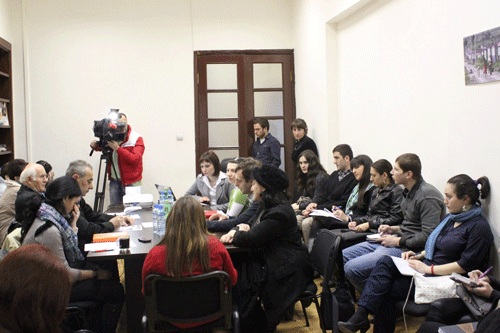The main speakers were: Rezo Getiashvili, the coordinator of Caucasus Environmental NGO Network (CENN); Rusudan Mchedlishvili – legal advisor of Article 42 of Constitution and Sopo Benashvili – the deputy head of Department of Justice of the office of Public Defender.
As it was noted at the meeting, according to the Ministry of IDPs from the Occupied Territories, Accommodation and Refugees, 35 204 families are registered in Georgia as a result of natural catastrophes that emphases on the impact of this problem. There is no long-term strategy of ecological migration and no relevant legislation.
“The country suffers approximately 100-150 thousand GEL every year as a result of natural catastrophes. For the last 10 years the number of victims has surpassed 400 people. In 2008, a family, including 3 little children died as a result of landslide in Adjara region. On this light, the state managed to resettle 100 families a year on average. But no resettlement took place during 2009-2010. Thus, with this paste, more than a century will be needed for resettling 11 thousand people and it is impossible. These people are left helpless,” – stated Rezo Getiashvili.
Rusudan Mchedlishvili talked about the legislative shortcomings in the legislation concerning the eco-migrants: “According to the UN guiding principles on internal displacement: “internally displaced persons are persons or groups of persons who have been forced or obliged to flee or to leave their homes or places of habitual residence, in particular as a result of or in order to avoid the effects of armed conflict, situations of generalized violence, violations of human rights or natural or human-made disasters, and who have not crossed an internationally recognized State border.” However, unlike this formulation, the term “internally displaced person” in Georgian legislation does not cover the group of people who were forced to leave the place of permanent residence as a result of natural disasters. As the eco-migrants do not fall in the definition of IDPs defined by Georgina Law on Internally Displaced Persons and as there is no other law that could ensure the mechanism of legal protection, we can say that the Article 42 of the Constitution and article 6 of the European Conventions, namely the right to address the court are violated.”
According to Rusudan Mchedlishvili, because of this legislative shortcoming, the victims of natural disasters are left without the status and the social defense and guarantees.
It is noteworthy that in the 2010 Parliamentary report of Public Defender a separate chapter was dedicated to the problems of victims of natural disasters and eco-migrants. Soon the public defender is planning to prepare special report on this issue.
“For the last years, the public defender is often addressed by the internally displaced persons as result of natural disaster – eco-migrants that shows that this is not a problem of one or two people. It is a system problem and the worst is that the state does not possess comprehensive information on eco-migrants, thus there is no common vision towards the solution of this problem,” – stated the representative of public defender Sopo Benashvili.
The meeting was also attended by the representatives of National Agency of Environment – Department of Geological Danger and Geological Management.
“For the next months the situation will be very hard in Adjara, Racha-Lechkhumi, mountainous part of Imereti, Samegrelo, Svanedi and Mtskheta-Mtianeti – these are the main risk zones. In fact, it is the whole Georgia,” – stated Emil Tsreteli, the representative of Department of Geological Danger and Geological Management.
“In 2005 we were resettled to the village Aleksandrovka of Tetritskaro region from the region of Mestia. However, the houses have not been registered yet. In sum, it is about 15-20 families. We do not know who these houses belong to – state or private owners. They answer us non-officially, in a verbal form that the Ministry is working on this and certain time is needed. However, as I told you, five years has been passed after the resettlement. The absence of agricultural land is also a problem. The agriculture is the only income of these people and the lands given to these people are not sufficient,” – stated Giorgi Margiani, eco-migrant from the Mestia Region.
It should be noted that the Human Rights House is the member of newly established Civil Coalition on Migration Issues (http://ecomigrants.wordpress.com/). The coalition comprises of seven NGOs (Article 42 of Constitution; CENN; ECMI Caucasus; Regional Media Association; Tbilisi Human Rights House; Human Rights Center and Institute for War and Peace Reporting). The mission of the coalition is initiating legislative amendments, monitoring situation and subsequent reporting.
Shorena Latatia





